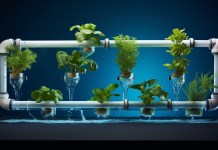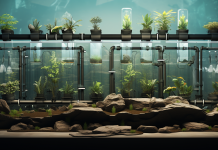In the realm of hydroponics, pH is a fundamental concept that requires our understanding and attention. The pH level holds a position of particular importance. This seemingly minuscule detail, measured on a scale between 0 and 14, becomes a crucial determinant of your garden's success or stagnation. But what is pH exactly, and why does it matter so much in hydroponics?
The Science Behind Ph
One of the key aspects in understanding the science behind pH is the measurement of the concentration of hydrogen ions in a solution.
pH is a way to measure the acidity or alkalinity of a substance. Acidity refers to solutions that have a higher concentration of hydrogen ions, while alkaline substances have a lower concentration of hydrogen ions.
The pH scale ranges from 0 to 14, with 0 being the most acidic and 14 being the most alkaline. A pH of 7 is neutral.
When a substance is acidic, it has a higher concentration of hydrogen ions, which means it can donate protons. On the other hand, alkaline substances have a lower concentration of hydrogen ions, making them capable of accepting protons.
Why is this simple number so significant? The pH level of your hydroponic system influences the plant's ability to absorb essential nutrients. It’s like setting the table for the plants. An improper pH level might mean that essential nutrients are not effectively available to the plants, which could lead to deficiencies, hampered growth, or even death.
Understanding Ph Levels
To fully comprehend the significance of pH levels, it is important to understand how they can indicate the acidity or alkalinity of a substance. The pH scale ranges from 0 to 14, with 0 being the most acidic and 14 being the most alkaline. A substance with a pH of 7 is considered neutral.
pH levels are determined by the concentration of hydrogen ions in a solution. When a substance has a higher concentration of hydrogen ions, it is classified as acidic. On the other hand, substances with a lower concentration of hydrogen ions are considered alkaline.
Understanding pH levels allows us to determine the nature of substances and their potential effects on other substances or organisms.
The Importance of Ph Balance
Hydroponic systems generally favor a slightly acidic pH level, often between 5.5 and 6.5. However, the optimal pH range can slightly vary based on the specific plants you are growing. Each plant type comes with its own set of preferences and tolerances, and recognizing this is key to managing pH effectively.
Consistent monitoring is essential in maintaining the correct pH levels. Regular checks help in making timely adjustments, ensuring that the environment remains conducive to healthy plant growth. The frequency of these checks can be determined by the stability of your system, but it is advisable to make it a routine part of your garden management.
Key Takeaways
- pH measures the concentration of hydrogen ions in a solution.
- Acidity refers to higher concentration of hydrogen ions, while alkalinity refers to lower concentration.
- pH scale ranges from 0 to 14, with 0 being acidic and 14 being alkaline.
Conclusion
In conclusion, understanding pH and its significance is crucial for maintaining a balanced environment and promoting human health. The science behind pH levels explains the chemical properties of substances and their reactions.
pH balance is essential for various biological processes and the functioning of ecosystems.
By recognizing the impact of pH on your hydroponics system you can make informed decisions to protect and enhance plants and growth.
Please see our supporting article:
How Ph Affects Microbial Activity


